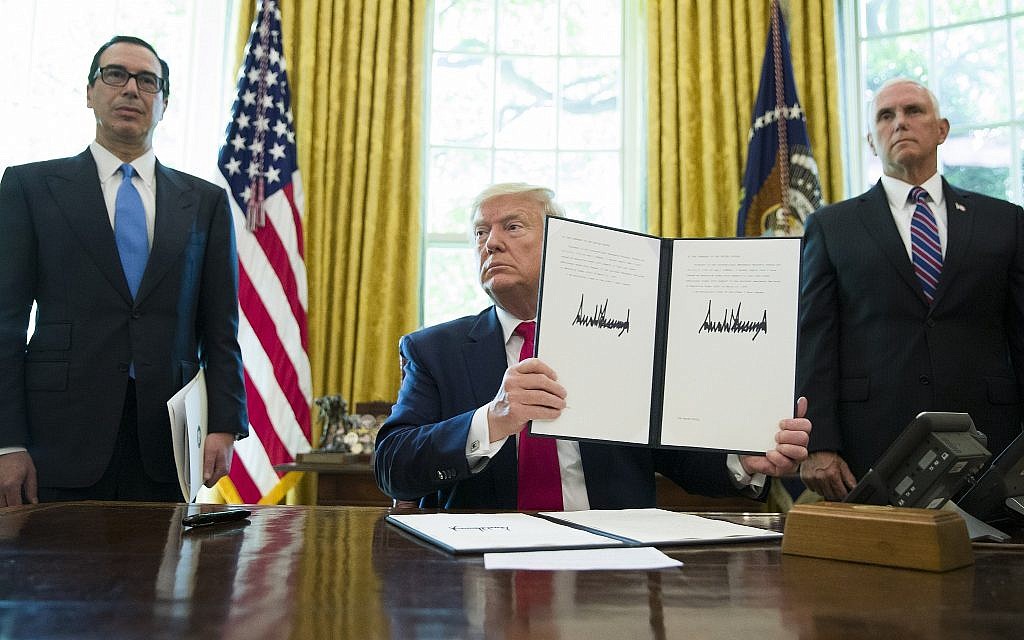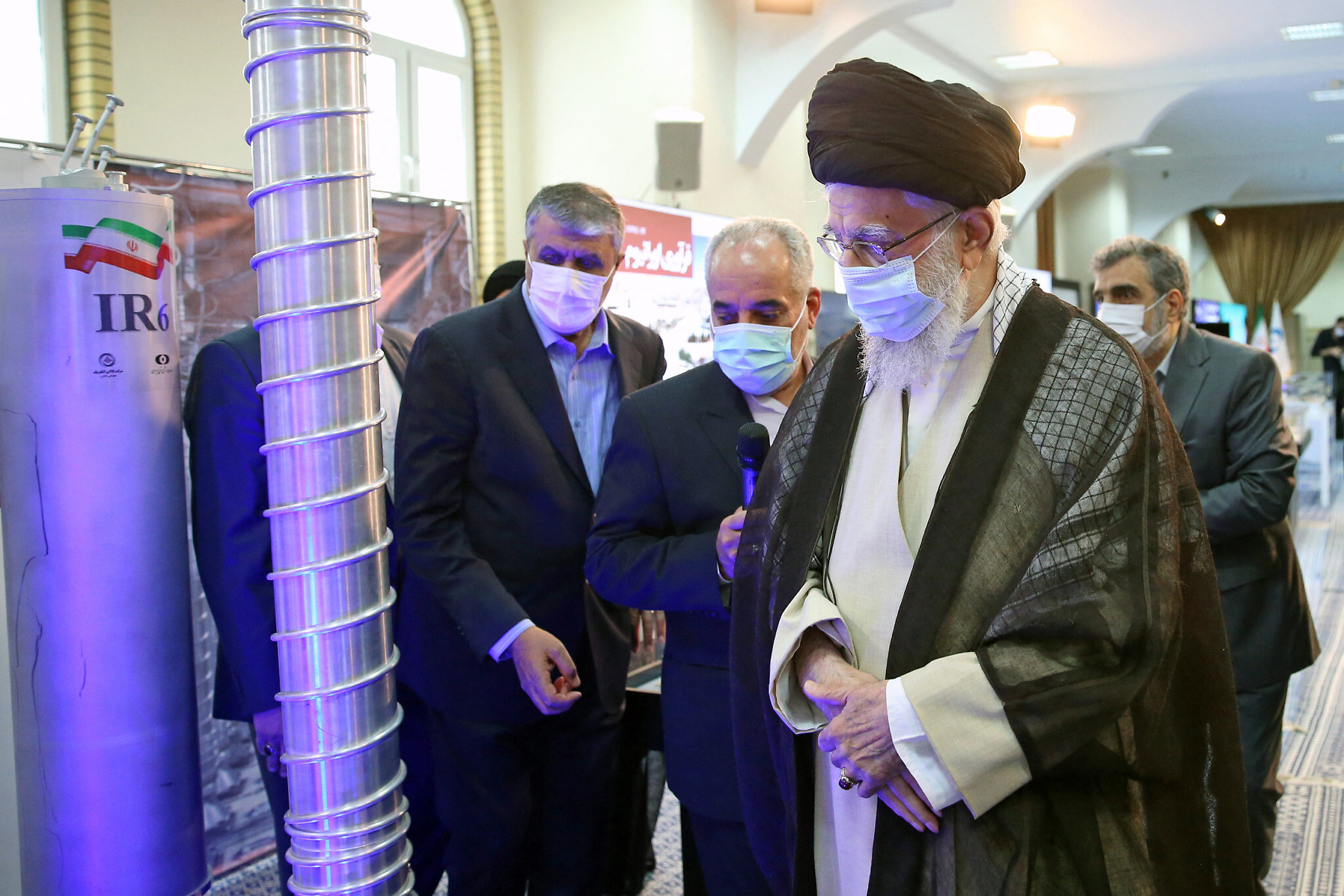Iran fears Trump win would bring Israeli strikes on nuclear sites, Western sanctions
Tehran said to believe that if reelected, the former US president would exert the utmost pressure on Khamenei to cave to nuclear containment deal on Washington and Israel’s terms
Reuters and The Times of Israel
Nov 3, 2024

DUBAI — Iran’s leadership and allies are bracing for what they would regard as a dreadful outcome of the imminent US presidential election: a return to power of Donald Trump.
Opinion polls suggest that Republican Trump and Democratic Vice President Kamala Harris remain locked in a close contest. But Iranian leaders and their regional allies in Lebanon, Iraq, and Yemen are concerned that Trump could well triumph on November 5 and this could spell more trouble for them.
Iran’s main concern is the potential for Trump to empower Prime Minister Benjamin Netanyahu to strike Iran’s nuclear sites, conduct targeted assassinations, and reimpose his “maximum pressure policy” through heightened sanctions on its oil industry, according to Iranian, Arab and Western officials.
They anticipate that Trump, who was president in 2017-21, will exert the utmost pressure on Iranian Supreme Leader Ayatollah Ali Khamenei to cave in by accepting a nuclear containment deal on terms set by himself and Israel.
This potential change in US leadership could have far-reaching implications for the Middle East balance of power and might reshape Iran’s foreign policy and economic prospects.
Iran and its proxies have long threatened Israel with destruction and called to wipe out the Jewish state.
Analysts argue that whether Harris or Trump leads the next US administration, Iran will lack the leverage it once held — largely due to Israel’s year-old military campaign aimed at degrading the Islamic Republic’s armed proxies, including the terror groups Hamas in Gaza and Hezbollah in Lebanon.
However, Trump’s stance is perceived as more detrimental to Iran due to his more automatic support for Israel, they added.
“Trump will either put very tough conditions on Iran or let Israel carry out targeted strikes on its nuclear facilities. He is fully endorsing a military action against Iran,” Abdelaziz al-Sagher, head of the Gulf Research Center think tank, said.
“It’s Netanyahu’s dream day to have Trump back in the White House,” he told Reuters.
Poison chalice?
A senior Iranian official who declined to be named told Reuters Tehran was “prepared for all scenarios. We have [for decades] consistently found ways to export oil, bypassing harsh US sanctions… and have strengthened our ties with the rest of the world no matter who was in the White House.”
But another Iranian official said a Trump victory would be “a nightmare. He will raise pressure on Iran to please Israel… [and] make sure oil sanctions are fully enforced. If so, [our] establishment will be economically paralyzed.”
In an election speech in October, Trump stated his unwillingness to go to war with Iran but said Israel should “hit the Iranian nuclear first and worry about the rest later,” in response to Iran’s massive ballistic missile attack on Israel on October 1. Iran launched some 200 ballistic missiles at Israel, sending most of the population rushing to bomb shelters and safe rooms. The attack caused relatively minor damage to military bases and some residential areas, and killed a Palestinian man in the West Bank.

Khamenei on Saturday threatened Israel and the US with “a crushing response” to attacks on Iran and its allies. “The enemies, whether the Zionist regime or the United States of America, will definitely receive a crushing response to what they are doing to Iran and the Iranian nation and to the resistance front,” Khamenei said in video released by Iranian state media.
Iran’s choices are limited going forward, analysts say.
“The reality is: Trump is going to support Netanyahu and give him the green light to do whatever he wants,” said Hassan Hassan, an author and researcher on Islamic groups. “Trump is much worse [than Harris] for Iran.”
Hassan noted that Washington has delegated a substantial share of responsibility to Israel in the conflict with Iran and its proxies, with Israel leading the way. “The US is involved enough in that it’s backing Israel, maybe more so than before.
“This time it’s just things are really bad for Iran. Iran is seen as a problem by both Republicans and Democrats.”
During her campaign, Harris called Iran a “dangerous” and “destabilizing” force in the Middle East and said the US was committed to Israel’s security. She said the US would work with allies to disrupt Iran’s “aggressive behavior.”
But Trump’s reelection would be a “poisoned chalice” for Khamenei, according to two regional officials.

If he were to reinstate stringent sanctions, Khamenei may be forced to negotiate and accept a nuclear pact more favorable to US and Israeli terms to preserve theocratic rule in Iran, which is facing growing foreign pressure and has been buffeted by bouts of mass protest at home in recent years.
A US-Saudi defense pact tied to Riyadh’s establishing diplomatic relations with Israel, now in its final negotiating stages, poses a significant challenge to Khamenei too.
This alliance threatens to shift the regional balance of power by creating a more unified front against Iran, impacting its geopolitical standing and strategy in the Middle East.
New architecture
Hassan said Israel’s recent retaliatory attacks on Iran and strikes on the leadership of terror proxies Hamas and Hezbollah allies have been widely perceived as a significant success. They offered insights into what a limited strike on Iran might look like, setting a precedent and altering assumptions that military action on Iran would inevitably spark a wider Middle East war.
A senior Arab security official said that Tehran could “no longer brandish its influence through its armed proxies” in the wake of Israel’s deadly strikes on Hezbollah and Hamas leaders.
For its own part, Iran has every reason to fear another Trump term.
It was Trump who in 2018 unilaterally pulled the US out of Iran’s 2015 nuclear deal with world powers and ordered the killing of Qassem Soleimani, Khamenei’s right-hand man and mastermind of overseas attacks on US and allied interests.

Trump also imposed punitive sanctions targeting Iran’s oil export revenues and international banking transactions, which led to extreme economic hardship and exacerbated public discontent in the Islamic Republic.
He frequently said during his presidential campaign that US President Joe Biden’s policy of not rigorously enforcing oil export sanctions has weakened Washington and emboldened Tehran, allowing it to sell oil, accumulate cash, and expand its nuclear pursuits and influence through armed militias.
In March, Trump told the Israel Hayom newspaper in an interview that Iran could have a nuclear weapon in 35 days and that Israel — which deems Iran’s nuclear activity an existential threat — was in a “very treacherous and dangerous neighborhood.”
An Arab government adviser noted that Tehran recognizes there is a “new architecture in the making,” but also that Trump, despite his tough rhetoric, realizes there is no alternative to a deal with Iran given its accelerated uranium enrichment program.
“Trump might aim for a new nuclear agreement, he could say I tore up the 2015 agreement because it was incomplete and replace it with a long-lasting agreement, touting it to ‘make America great again’ and preserve US interests,” the adviser said.
As the 2015 deal has eroded over the years, Iran has escalated the level of fissile purity in enriched uranium, cutting the time it would need to build an atom bomb if it chose to, though it denies wanting to.

Iran Online, a state-run news website, stated that when Trump left office, Iran was capping enrichment at 3.67 percent under the deal, far below the 90% of weapons-grade uranium.
Now, Iran has “enriched uranium to 60% with IR-6 advanced centrifuges” and could achieve nuclear weapons capability “within a few weeks… Completing the nuclear deterrence cycle is Iran’s greatest trump card against Trump,” it said.
Arab and Western officials warn that the more Iran hints it is nearing the development of an atomic bomb, the more it incites the need for Israel to strike.
“If Trump reassumes power, he will support Israeli plans to strike Iranian nuclear facilities,” a Western official said.
2 comments:
Maybe the goat fuckers had better make a deal NOW, they might not be able to in two months.
Israel doesn't need any permission to wage deadly war on people trying to kill them.
Post a Comment